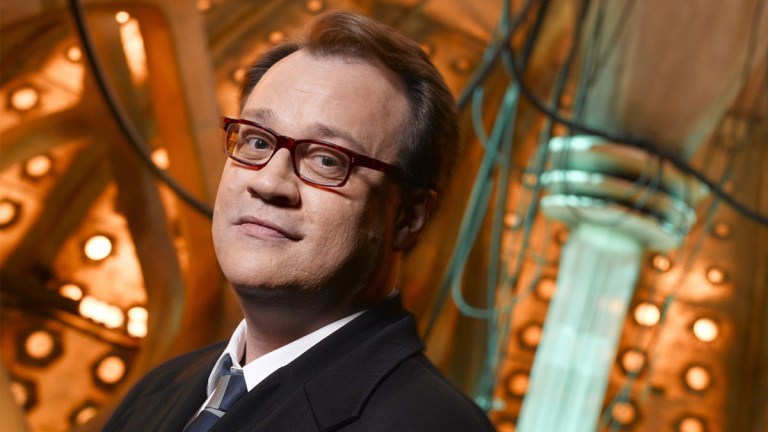Doctor Who: Why Is It So Difficult to Replace the Showrunner?
Chris Chibnall's comments about finding the next Doctor Who showrunner suggest it wasn't a simple process.

Doctor Who showrunner is one of the most high-profile TV jobs in the U.K. But that doesn’t mean it’s necessarily one of the most sought-after. Last month, the BBC rocked the Whoniverse when it announced that Russell T. Davies, the man who relaunched Who in 2005, would be returning as the next showrunner, with Bad Wolf Productions coming on to co-produce alongside BBC Studios. No doubt the BBC is hoping that Davies (and Bad Wolf’s Julie Gardner and Jane Tranter) will be able to capture some of the magic of their NuWho era, and get a broad audience excited about the show again. But was that always the post-Chibnall plan?
During a recent press conference promoting the upcoming Season 13 premiere, current showrunner Chris Chibnall answered some questions about “passing the baton” onto Davies, saying: “I’ve been throwing batons at people for about a year now and finally someone’s picked it up.” The comment suggests that the BBC potentially approached others about the Doctor Who showrunner position prior to offering the job to Davies, or perhaps that Davies was initially hesitant to pick up the baton, as it were, and took some convincing. This is not necessarily surprising, but does yield some follow-up questions: Just how many people have turned down the Doctor Who showrunner job over the years? And why does it often seem so damn difficult to find a Doctor Who showrunner?
That latter question is the easier to answer… one need look no further than another Chibnall quote from the same press conference, regarding his post-Who life: “Frankly, I’ll get to see my family again, which has been really nice.”
The Doctor Who production schedule is notoriously grueling, especially compared to other British TV productions. Earlier this year, Eleventh Doctor Matt Smith told Port Magazine: “Of course you miss Doctor Who; everyone misses it; it’s the best job in the world, but it’s challenging and taxing as well. That’s why people often only get to three or four years before they throw the towel in, because it places so many demands.” Billie Piper told the Guardian earlier this year that she wouldn’t consider a Doctor Who return, citing the production schedule: “I wouldn’t go back. It’s a great role, but you’re away from your kids for so long. My experience was that you were in Wales for nine months solid. And as a job it dominates your life.”
More recently, Bradley Walsh and Tosin Cole, who played Graham and Ryan respectively alongside Jodie Whittaker’s Doctor in Seasons 11 and 12, decided to depart the show. Walsh told Hello Magazine of the decision: “We have great fun doing it. But you must sleep and look after yourself, because if you don’t, you will come unstuck. This is ten months of ramming speed. That’s what it is. I’m in my 60th year. It’s tough. It’s hard. It’s relentless. It really is. This ain’t an easy gig.”
The demanding status quo of the Doctor Who production schedule is most commonly referenced in relation to actor turnover, but it’s obviously a factor for everyone who works on the show, including showrunner and, most especially, the crew, who tend to work the longest days and get paid the least for it. In recent weeks, U.S. film and TV production conditions have been in the entertainment news, as the International Alliance of Theatrical Stage Employees (IATSE) reached a tentative (and controversial) agreement with major TV and film studios, averting a planned strike that would have shut down TV and film production across the country, and potentially affected some productions internationally, including in the U.K. Should it be ratified, the new agreement will guarantee IATSE workers a 10-hour turnaround time between shifts, a 54-hour weekend rest period, a hike in meal penalties (compensation for crews that work more than six hours without a meal break), a rise in wages for the lowest-paid workers, and more.
The IATSE negotiations are relevant to the U.K. industry, as the sector has seen a boom in film and TV production over the last decade that has, as a recent Variety article asking the question “As IATSE Threatens Action in the U.S., Are U.K. Crews Ready to Do the Same?” summarizes it, “longer working hours, pressurized working conditions and an acute skills shortage.”
“We wanted to show that we are conscious of what’s going on [in the U.S.]” one of the crew members behind the @britcrewstories Instagram account told Variety, “and feel the same about hours, rates and deteriorating conditions in some productions in the U.K.” Bectu, the organization that represents U.K.’s below-the-line production workers, is currently negotiating its TV drama agreement with producers’ trade organization Pact.
When Chibnall asked Davies and Steven Moffat for advice about the Doctor Who showrunner job, they told him to enjoy it while it’s happening because you’ll miss it after, Chibnall recounted at the Season 13 press conference. For many, working on Doctor Who is a dream job, but it’s important to hold both the “dream” and “job” parts of that term in tandem. For those people who work on Doctor Who (and on any of our favorite shows)—especially the below-the-line workers who don’t get the same level of recognition or compensation as showrunners or lead actors—it is a job, and a particularly grueling one at that.
